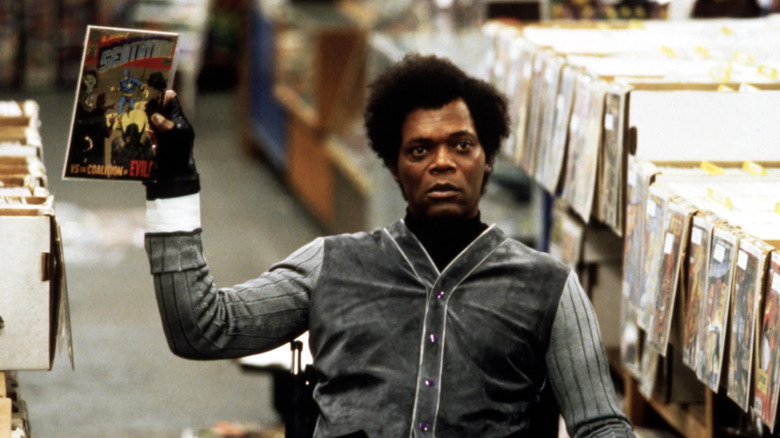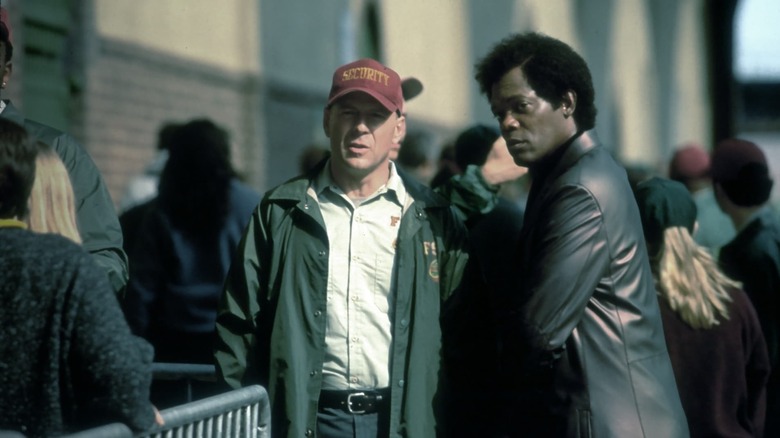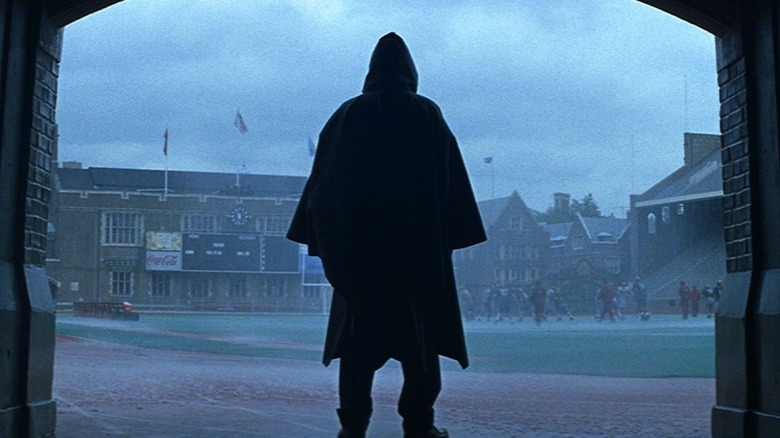Disney Wasn't Convinced M. Night Shyamalan's Unbreakable Would Appeal To Audiences
"Unbreakable," like most of M. Night Shyamalan's films, reveals itself slowly. The film is downbeat, depressive, and is presented as a mystery. David Dunn (Bruce Willis) is the only survivor or a massively destructive train accident, and he doesn't have a scratch on his body. Although he evaded death, David is too despondent over his flagging marriage to much notice how extraordinary it is. Once a football hero in high school, David now works as a mere security guard, resigned to a dull life.
Samuel L. Jackson plays Elijah Price, a dealer of rare comic book art who is afflicted with an in-born medical condition that leaves his bones incredibly brittle and prone to breakage. Following the train accident, Price appears to Dunn to present him with a wild theory. If there are people in the world who break easily, then there must be, for the sake of cosmic balance, people who are unbreakable. Dunn, in surviving the train crash, may be the man Price is looking for. Over the course of the film, Dunn comes to realize that there may be some truth to this theory.
By the film's end, both Dunn and Price come to realize that their relationship has evolved into something resembling a superhero/supervillain relationship that one might find in the comics Price sells. Price has internalized the basic good/evil narratives from comic books to the point that he can only accept the world in those terms. It's notable that "Unbreakable" was released prior to Sam Raimi's "Spider-Man," the film that was to kick off two decades of dominant superhero blockbusters in earnest.
No one would come to see a movie about comic books
Shyamalan would eventually, like many modern superhero blockbusters, begin constructing an expanded cinematic universe with Dunn and Price. The end of his 2016 film "Split," a pulpy thriller about a kidnapper with multiple personalities (James McAvoy), featured a post-credits stinger that revealed Dunn to be investigating villainy. The characters of "Unbreakable" and "Split" would unite in the 2019 film "Glass," a shabby, low-budget affair that, sadly, doesn't pay off in any interesting ways. It would later be revealed that Willis had long been suffering from aphasia, which affected his performances.
When Shyamalan first pitched "Unbreakable," though, comic book movies and interconnected cinematic universes were years away from being in vogue. In a 2021 interview with Variety, the filmmaker admitted that Buena Vista Pictures, the distributor of "Unbreakable," were a bit squirrely about its subject matter. The studio wanted Shyamalan to lean into the film's horror aspects so that it resembled the director's previous hit "The Sixth Sense" more closely. Shyamalan did indeed make "Unbreakable" feel bleak and horrific, and noted that the higher-ups were concerned a comic book movie wouldn't be accessible:
"If I could go back, I would underline the differences between the movies more than we did. [...] You know, 'Unbreakable' is not scary. It's strange. It's a comic book movie. That's the irony, right? The thing that we were running from the thing they stay with scared most of, is that it's about comic books! That's the thing that they were so worried about, that no one would come to see a movie about comics. This is Disney. Would they know this many years later that they would bank the entire thing on that same thing that they were so scared to even talk about?"
Leading trends, following trends
Shyamalan repeated similar sentiments a year earlier in an interview with the Ringer, where he noted that comic book movies weren't yet viable at the box office (at least not outside of Batman), making "Unbreakable" officially ahead of its time. He also noted that his film came to him when he was feeling very, to use his word, burdened. He was, generally speaking, in a very somber mood, and that somberness definitely came across in the movie. On the "Unbreakable" DVD special features, there is even a deleted scene wherein Dunn weeps in the shower. It's a film about falling apart just as much as it is about finding your strength. "Unbreakable" has the trappings of comic books, but its funereal tone might be its most notable detail.
Comic book movies managed to come out at a steady clip throughout the 1990s. In addition to high-profile Batman sequels, the decade also saw comic strip heroes like the Phantom, the Shadow, Dick Tracy, and the Rocketeer grace screens. This was in addition to oddball comedy films like "Tank Girl," "The Mask," and "Mystery Men." Shyamalan's film came at the end of that wave, serving (like "Mystery Men") as a sort-of deconstructionist essay on the genre. It wouldn't be until the release of the first "Harry Potter" and "Lord of the Rings" movies in 2001 that blockbusters would prove interconnectivity and planned sequels could be lucrative.
Audiences have now lived with interconnected superhero stories for so long that it's become an expected part of the blockbuster landscape. Why make one when turning a franchise into a permanent fixture is so much more alluring? It's perhaps telling that when Shyamalan tried to follow a trend with "Glass," the result was less than stellar.


